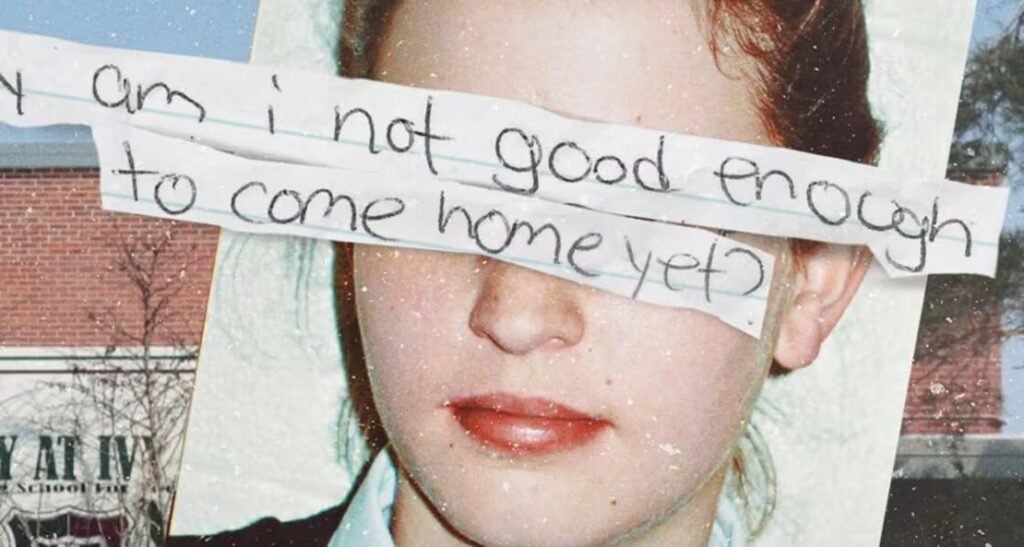Netflix has once again captivated audiences with its latest true-crime docuseries, “The Program: Cons, Cults, and Kidnapping.”
This gripping three-episode limited series, part of the 2024 lineup of cult documentaries on Netflix, delves into the chilling events that unfolded at the Academy at Ivy Ridge, a boarding school for troubled teenagers that operated from 2001 to 2009 in upstate New York.
Directed by Katherine Kubler, a former student at Ivy Ridge and now part of the cast of “The Program: Cons, Cults, and Kidnapping,” the series follows her and her classmates as they revisit the now-shuttered school, recounting the horrific experiences they endured under the guise of rehabilitation.
“The Program” has ignited a much-needed conversation about the troubled teen industry, a multi-billion dollar industry that promises to reform troubled youths but often employs questionable and abusive tactics.
The Academy at Ivy Ridge: A Sinister Regime
As part of the World Wide Association of Specialty Programs and Schools (WWASPS), a Utah-based organisation with programs for troubled teens across the nation, the Academy at Ivy Ridge promised to transform troubled youths.
However, former students paint a drastically different picture, recounting years of isolation, physical and psychological abuse, and a draconian points system that determined the length of their stay.
“They dehumanise the kids, that these kids are liars, manipulators, and they use that to create compliance,” one docuseries participant said, shedding light on the institution’s manipulative tactics.
Students were subjected to an authoritarian regime that involved solitary confinement, physical restraint, and a points system that controlled their every move.
They were isolated from their families, discouraged from forming bonds with their peers, and were “treated like prisoners,” as one staff member attested in the show.
The Chilling Accounts of Abuse
The series delves into the harrowing accounts of former students, who describe a “brainwashing” experience where they were forced to comply with a program that painted them as manipulative, drug-addicted, or beyond help.
They recall instances of being handcuffed, strip-searched, and forced to participate in “seminars” that included various exhausting and degrading activities, sometimes for days at a time.
One of the most disturbing aspects of the program were the Large Group Awareness Trainings (LGATs), which occurred every two months.
These events were designed to break the will of the students and make them more compliant.
Experts suggest that these LGATs manipulated the dopamine system, causing dysregulated dopamine levels that resulted in euphoria, psychological harm, and reckless behaviour.
The Riot and Aftermath
In 2005, a riot broke out at the Academy at Ivy Ridge, resulting in several expulsions and arrests.
As many as 30 students escaped during the riot, only to be returned by state troopers, U.S. Border Patrol agents, and other authorities.
The incident came after years of allegations of abuse and scrutiny by state investigative agencies.
Despite the riot, the school continued to operate until 2009, raising questions about the lack of oversight and accountability in the troubled teen industry.
Public Response and Legal Actions
The release of “The Program” has sparked a wave of abuse reports, leading to an investigation into the Academy at Ivy Ridge by local law enforcement.
The St. Lawrence County District Attorney’s Office has received numerous reports of physical and sexual abuse from former students now scattered across the country, prompting the launch of an official investigation.
The series has also reignited the conversation about the troubled teen industry, a billion-dollar industry that encompasses wellness centres, wilderness programs, boot camps, and residential treatment nters.
While these institutions promise to rehabilitate children with behavioural issues, mental illness, or substance abuse problems, “The Program” exposes the dark side of this industry, highlighting issues of abuse, exploitation, and manipulation.
Impact and Reception
“The Program: Cons, Cults, and Kidnapping” has been a resounding success for Netflix, racking up 22.7 million viewing hours between its March 5 premiere and March 10, making it the third most-watched English TV show of the week on the platform.
The series has been commended for its meticulous storytelling, its courage in exposing the dark underbelly of the troubled teen industry, and for giving a voice to the survivors.
The docuseries has also sparked a broader conversation about the need for greater scrutiny and regulation of the troubled teen industry.
As Paris Hilton, a prominent advocate for survivors of the industry, stated in her 2021 testimony before Congress, “The children who come out of these facilities are severely traumatised, and they have complex PTSD and other issues that scar them for life.”
Conclusion
“The Program: Cons, Cults, and Kidnapping” is a powerful and harrowing exposé that has shed light on the disturbing realities of the troubled teen industry.
By giving survivors a platform to share their experiences, the series has sparked a much-needed conversation about accountability, transparency, and the need for reform within this multi-billion-dollar industry.
As the investigation into the Academy at Ivy Ridge continues, “The Program” serves as a stark reminder of the importance of vigilance and oversight in protecting the rights and well-being of vulnerable youths.
You might also like:
- Alex Garland’s Civil War Movie: A Powerful Exploration of America’s Descent
- Everything You Need to Know About the New Thriller Mothers’ Instinct Starring Anne Hathaway and Jessica Chastain
- Unravelling the Profound Message: Foster the People’s Pumped Up Kicks Explained
- Nirvana’s Smells Like Teen Spirit: A Deep Dive into the Lyrics and Legacy


